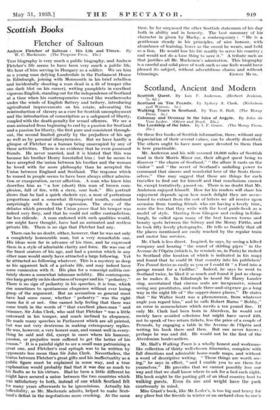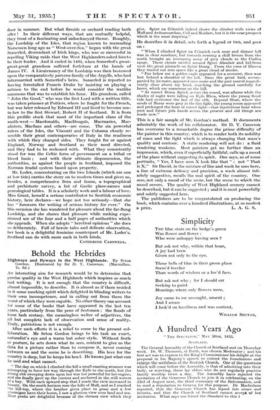Scotland, Ancient And Modern
Colonsay and Oronsay in the Isles of Argyle. By John de - Vere Loder. (Oliver and Boyd.. 35s.)
The Lordship of the Isles. By I. F. Grant. (The Moray Press. 21s.)
OF these five books of Scottish information, three, without any
depreciation of their several values, can be shortly described. The others ought to have more space devoted to them than is here practicable.
Mi. Anderson and his wife covered 18,000 miles of Scottish road in their Morris Minor car, their alleged quest being to discover " the charm of Scotland," " the allure it casts on the visitor " and " the secret of Scotland's unfailing power to
command that sincere and wonderful love of the Scots them- selves." One may suggest that these are things for each traveller to find out for himself and that conclusions cannot be, except tentatively, passed on. There is no doubt that Mr.
Anderson enjoyed himself. How far his readers will share his enjoyment depends upon how much delight they Are accus- tomed to extract from the sort of letters we all receive upon occasion from touring friends who are having a lovely time, none the less that they write with the local guide-book as a model of style. Starting from Glasgow and ending in Edin- burgh, he called upon many of the best known towns and beauty spots between the Solway and the Moray Firths, and he took fifty lovely photographs. He tells us frankly that all the places mentioned are easily reached by the regular train and motor bus services.
Mr. Clark is less direct. Inspired, he says, by seeing a kilted company and hearing " the sound of skirling pipes " in the Avenue de l'Opera (which is, he reminds us, in Paris) he rushed to Scotland (the location of which is indicated in his map)
and found that he could fit that country into his publishers' Ten Pound Series as easily as you or I could fit " a Ford into a
garage meant for a Cadillac." Indeed, he says he went to Scotland twice, he liked it so much and found it just as cheap as he makes it. In Edinburgh he- heard- Sir Harry Lauder
sing, ascertained that cinema seats are inexpensive, missed
seeing any prostitutes, and made three-and-sixpence go a long way in the night life of " the supper-dance places." He states
that " Sir Walter Scott was a phenomenon, from whatever angle you regard him," and he calls Robert Burns " Bobby," an error in nomenclature which merits, a. ten pound fine. If only Mr. Clark had been born in Aberdeen, he would not merely have avoided solecisms but might have saved £20,
not to speak of two return tickets, less the price of a couple of Pemods, by engaging a table in the Avenue de l'Opera and, writing his book there and then. But one never knows ; perhaps he was and did. He would not be the first of the Aberdonian boulevardiers.
Mr. Hall's Walking Tours is a wholly honest and workman- like collection of thirty well-chosen itineraries, complete with
full directions and admirable home-made maps, and without a word of descriptive writing. " Those things are worth see- ing," he says in effect, " and I enable you to see them for yourselves." He provides that we cannot possibly lose our way and that we shall know where to ask for a bed each night. His book might be the parting gift of an ideal country host to
walking guests. Even its size and weight have the pack
courteously in mind.
Miss Grant's book, like Mr. Loder's, is too big and heavy for any place but the fireside in winter or an orchard close to one's
door in summer. But what fireside or orchard reading both offer ! In their different ways, that are mutually helpful, they treat of a fascinating and unhackneyed theme. Roughly, the Lordship of the Isles, that region known to marauding Norsemen long ago as " West-over-Sea," began with the great Somerled, descendant of Irish kings, who was so successful in repelling Viking raids that the West Highlanders asked him to be their leader. And it ended in 1493, when Somerled's great- great-great grandson suffered forfeiture at the hands of James IV. A Lieutenancy of the Lordship was then bestowed upon the comparatively parvenu family of the Argylls, who had intermarried with Somerled's heirs. Somerled is reported as having forestalled Francis Drake by insisting on playing a salmon to the end before he would consider the warlike summons that was to establish his fame. His grandson, called " John the Good," who was the first Lord with a written title, was taken prisoner at Poitiers, where he fought for the French, but was later released by Edward III and lived to become son- in-law to the first Stewart, Robert II of Scotland. It is from this prolific stock that most of the important clans of the south-west.— Ma.cdonalds; MacDougals, Macruaries, Mac- alisters, MacIans and others—are come. The six powerful rulers of the Isles, the Visconti and the Colonna closely re- semble their great contemporaries of Italy in the readiness with which they changed sides. They fought for or against England, Norway and Scotland as their need directed, and they had to be reckoned with. What they consistently stood for was the Celtic form of government on a tribal or blood basis ; and with their ultimate dispossession, the authorities, as against the people in Scotland, imposed the Norman feudal system based upon property.
Mr. Loder, concentrating on the two Islands (which are one at low tide) carries the story on to modern times and gives us, besides, a comprehensive flora and fauna, a topographical and prehistoric survey, a list of Gaelic place-names and genealogical tables. It is a scholarly work and a labour of love. Miss Grant, herself a serious contributor to Scottish economic history, here declares—we hope not too seriously—that she has " forsworn the writing of serious history for ever." On this occasion she has wandered for pleasure about the far-flung Lordship, and she shares that pleasure while making expe- rienced use of the four and a half pages of authorities which she appends. When she adopts " heretical opinions " she does so deliberately. Full of heroic tales and delicate observation, her book is a delightful feminine counterpart of Mr. Loder's. Scotland can do with more such in both kinds.
CATIIERINE CARSWELL.



























































 Previous page
Previous page